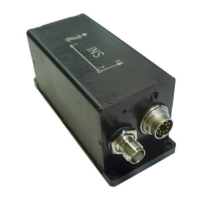INS
GUI User’s Manual
Inertial Labs, Inc
TM
Address: 39959 Catoctin Ridge Street, Paeonian Springs, VA 20129 U.S.A.
Tel: +1 (703) 880-4222, Fax: +1 (703) 935-8377 Website: www.inertiallabs.com
27
Notes:
1. It is important to set the magnetic declination correctly for the INS operation because it
requires to know the true heading which is calculated by addition of the magnetic
declination to measured magnetic heading.
2. Magnetic declination is calculated using the World Magnetic Model produced by the
U.S. National Geophysical Data Center and the British Geological Survey, see
http://www.ngdc.noaa.gov/geomag/WMM/DoDWMM.shtml
Since INS firmware version 2.2.0.2 the magnetic declination can be
calculated in the INS continuously using calculated current position and
time. Check “Auto” check-box (see Fig. 4.2) to activate this option.
Alignment angles (deg) – angles between the INS axes and the
carrier object are set after INS mounting, see “Appendix E. Variants of the
Inertial Labs
™
INS mounting relative to object axes”. Default values are set
to 0 degrees.
PV measuring point relative to the IMU (m) – sets coordinates of
measuring point for Position and Velocity calculation. Set coordinates of the
measuring point relative to the accelerometer mass-center of the INS unit
(see Appendix F, Fig. F.1) in the object axes – on the right, forward and up
directions, in meters.
Auto start – enables or disables automatic start of the INS and data
output after power on without any command from the host computer. See
section 10.6 for details.
Primary antenna position relative to the IMU (m) – sets the
primary GNSS antenna mounting lever relative to the INS unit, in meters.
After the INS unit and GNSS antenna installation on the carrier object it is
necessary to measure the center of antenna position relative to the
accelerometer mass-center of the INS unit, in the object axes – on the right,
forward and up directions (see Appendix F). Then it is necessary to enter
these coordinates in appropriate fields in the IMU tab (Fig. 4.2) and click
“OK” to apply these coordinates and store them in the INS nonvolatile
memory.
Secondary antenna position relative to the IMU (m) – sets the
secondary GNSS antenna mounting lever relative to the INS unit, in meters.
This option is supported for INS-D with firmware version since 2.9.1.7 and
allows the secondary antenna installation in arbitrary (but known) position
relative to the INS-D unit and primary antenna.

